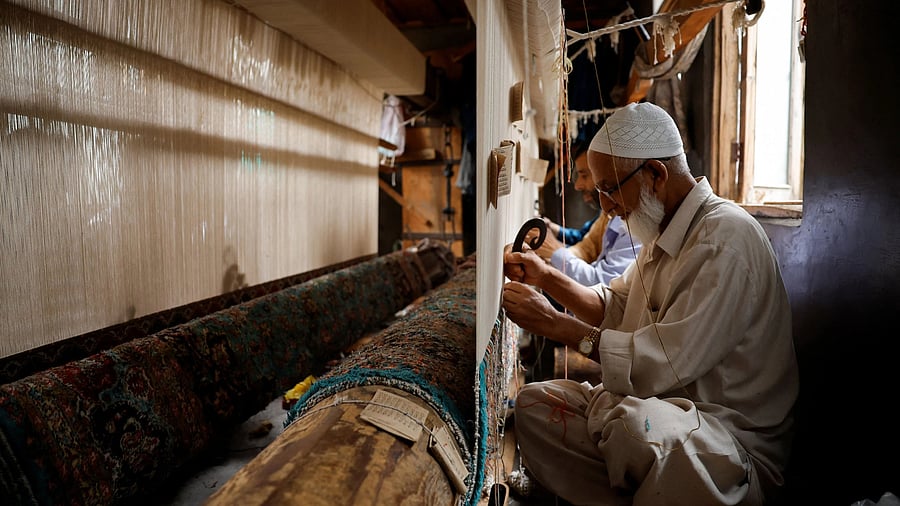
Ghulam Qadir, 75, weaves a Kashmiri hand-knotted carpet inside his workshop in Srinagar, Indian Kashmir, August 26, 2025.
Credit: Reuters Photo
Srinagar: The steep 50 per cent tariff imposed on Indian merchandise by the US has inevitably triggered panic among Kashmiri carpet exporters, who see it as a crippling hit on one of the Valley’s oldest and most labour-intensive trades.
Kashmiri carpets will now attract a staggering 52.9 per cent duty in the United States, up from just 2.9 per cent earlier. Exporters say the unprecedented hike will make the hand-knotted rugs prohibitively expensive for American buyers, who have for decades formed the backbone of Kashmir’s export market.
“The US has always been our most dependable market. A Kashmiri carpet worth $5,000 will now cost over $7,500 after duty. How will customers afford that?” asked Sheikh Ashiq, a Srinagar-based exporter. “This could be the death knell for an art that sustains thousands of families here.”
The centuries-old Kashmir arts industry is one of the Valley’s largest employers after agriculture, engaging weavers, dyers, designers and traders. A major chunk of its products are exported, with the US traditionally accounting for the biggest share.
According to trade data, other labour-intensive sectors such as woven apparel, diamonds, furniture, and textiles are also reeling under tariffs in excess of 50 per cent. Carpets, however, are particularly vulnerable given their dependence on the US market, which accounts for nearly 60% of total exports.
Industry insiders say the tariff shock has arrived at a time when the sector was already reeling from dwindling global demand, competition from machine-made carpets and the after-effects of political unrest in Kashmir.
Exporters fear that unless New Delhi negotiates relief from Washington, Kashmiri carpets will lose their competitive edge in the American market, potentially wiping out livelihoods across the Valley.
“We cannot simply find new markets overnight,” said Ashiq. “It took decades to build trust in the US. If buyers walk away now, we will be left with warehouses full of unsold stock.”
For weavers, the tariff war feels like a blow beyond their control. “We only know how to knot threads into patterns taught by our ancestors,” said Ghulam Nabi, a weaver. “But what will we do if there is no buyer left for our work?”
As trade tensions escalate, Kashmir’s famed carpets—once prized symbols of luxury in American homes—face an uncertain future, trapped in the crossfire of global politics.